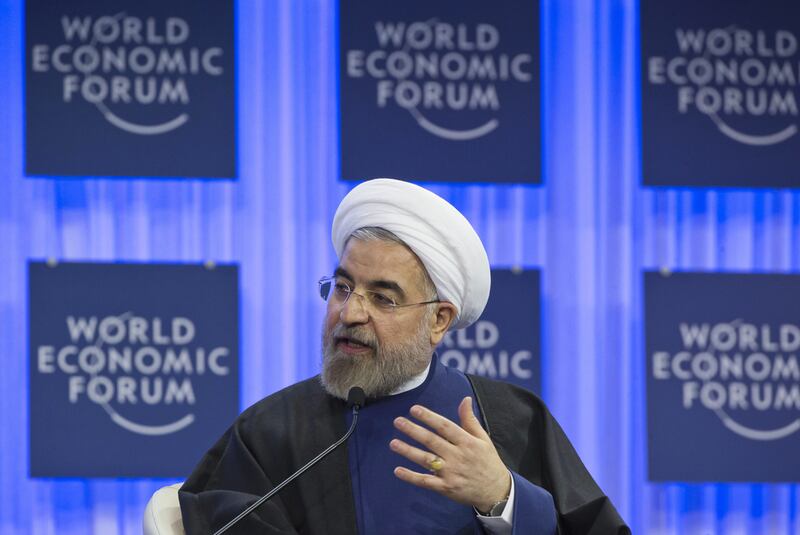Davos // Iran is open for business, the country’s president Hassan Rouhani told the annual meeting of the World Economic Forum in Davos, Switzerland.
On the first occasion for 10 years that an Iranian leader has attended Davos, Mr Rouhani committed Tehran to rapid economic growth and extended commercial relations with its neighbours, specifically mentioning the countries of the Arabian Gulf as potential partners in what he called “normal trade relations”.
Trade between Iran and GCC countries, including the UAE, has been hard hit by sanctions introduced by the United States over Iran’s nuclear ambitions. Recent negotiations between western powers and Mr Rouhani’s government has led to a loosening of financial and trade restrictions.
Mr Rouhani told politicians, businessmen and policymakers at the meeting that he wanted Iran to be among the top economic powers in the world. “Our economy has the potential to be among the top 10 in the next two decades. This is a goal I am promising and I am laying the groundwork for it while I am in office,” he said.
According to the IMF, Iran currently ranks at number 21 in the global rankings by GDP, which reached US$549 billion in 2012. To become a member of the top 10, its economy would have to become larger than that of India, at $1.84 trillion.
“Iran’s economy is close to the successful emerging market economies, and it will take its place among them,” he said.
He also told the meeting that he would seek to increase trade with the rest of the world, especially in neighbouring countries. “Economic cooperation is a priority for us, and for that reason we will seek to deepen ties with our neighbours. We intend to open and extend trade relations with Turkey, Iraq, Russia, Afghanistan,the countries of the Gulf littoral, the Caucasus and in central Asia,” he said.
Mr Rouhani identified energy as the key sector for trade. “Iran is prepared to engage with the rest of the global community on energy security. I met with energy experts earlier and this is our goal. It is the biggest factor leading to peace and stability in the [Middle East] region and the world,” he said.
Earlier, Mr Rouhani met with the heads of global oil companies, including Total, BP and Gazprom Neft, to discuss greater collaboration in his country’s oil business. He promised attractive contracts for foreign investment in Iranian oil would be available later this year.
The Iranian leader invited businessmen and policymakers at the meeting to visit his country. “Come to Iran and witness yourselves the opportunity for investment in our country. Come and experience Iranian culture,” he said.
His stance received cautious approval from experts and business people in Davos. Nouriel Roubini, the economist who predicted the global financial crisis in of 2008-09, said: “If they truly liberalise and reach an agreement on nuclear issues, and trade and reform, they have great potential in terms of capital and resources. The current regime has kept it back.”
Gerald Lawless, the chief executive of Jumeirah Group, the Dubai hotels and leisure group, said: “If a good enough project came along in Tehran or other parts of Iran for a luxury hotel that would fit the Jumeirah profile, of course we would consider it.”
However, a senior member of the Dubai financial hierarchy, who asked to remain anonymous, was more sceptical. “Iran has made peace with the West but they still seek to dominate the Gulf region. Imagine the regulatory problems if Iranian banks wanted to open up more in the UAE.”
fkane@thenational.ae





